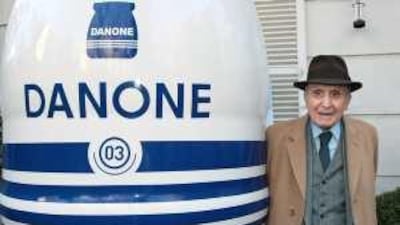Though Danone long ago abandoned its claim that regular consumption of its yoghurt products could prolong life, its founder, Daniel Carasso, was a living testament to the suggestion, surviving to the ripe old age of 103. His name became synonymous with yoghurt, once billed as a medicinal product, later a ubiquitous item on the breakfast table across all five continents. Born in 1905 in Thessaloniki, Carasso was the son of Isaac, a Greek-born Sephardic Jewish doctor whose family had fled persecution in Spain more than four centuries earlier. Isaac had a penchant for yoghurt, which in the Balkans was a dietary staple, but practically unknown elsewhere in Europe.
On returning to Spain, in the wake of the First World War, Isaac noted the prevalence of intestinal maladies among Spanish children. Influenced by the claim of the Nobel Prize-winning Russian microbiologist Elie Metchnikoff that introducing lactic-acid bacilli, found in yoghurt and sour milk, to the digestive system was most beneficial, he procured some cultures from the Pasteur Institute in Paris.
In Barcelona, Isaac opened a small yoghurt business, selling his product through local pharmacies, advertising its ability to prolong life. The diminutive of his son's name - "little Daniel" in Catalan - gave the Danone company its own, with an extra "e" to circumvent technical legalities. On his father's advice, the younger Carasso studied bacteriology at the Pasteur Institute and launched the Société Parisienne du Yoghourt in Paris in 1929. Despite the post-war economic slump, the French took to Danone yoghurt. Advertised as "dessert for happy digestion", it was packaged in small, returnable porcelain pots.
War interrupted Carasso's plans, forcing him and his wife to flee to America in 1942. There, together with two partners, he bought a tiny Greek-owned yoghurt company in the Bronx. As Danone sounded too foreign to appeal to the American market, the company became Dannon Milk Products. Initially, the medicinal connotations of yoghurt proved a hindrance to sales - as did the taste. The original product, as sold by Isaac, had been bitter, true to its Greek origins. Carasso experimented with an unstrained version, which made it lighter and fresher. When it still did not sell as hoped, he added a layer of jam at the bottom of the pot. It was a stroke of genius.
Greta Garbo was just one aficionado, while the United Nations cafeteria sold 300 jars a day. In 1959, Beatrice Foods bought the company and distributed Dannon products, including a low-fat version for dieters, from the East coast to the West, to Brazil, Mexico and Morocco. With the end of the war, so great was the association between Danone and France that Carasso took the company back to Paris. In 1981, he repurchased the American brand. A takeover bid by Pepsi in 2005 was rebuffed on the grounds that the company was "a national icon, a treasure that must remain French owned".
A master of modifications and marketing techniques, Carasso built Group Danone into one of France's largest food conglomerates, with 80,000 employees. He remained honorary chairman up until his death. In 1967, Danone merged with a cheese company, and in 1973, a bottling enterprise. "We don't like to emphasise the clinical side, because all those bacteria scare laymen," Carasso told The New Yorker magazine in 1947. More than 60 years later, the layman appears to respond only too favourably to the quasi-medicinal claims that once again appear in Danone advertisements, if worldwide sales of probiotic yoghurt drinks and little pots rich with Bifidus Actiregularis are anything to go by.
Daniel Carasso was born in 1905, and died on May 17. He is survived by one daughter. His wife, Nina, predeceased him. * The National

